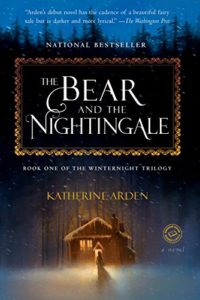Katherine Arden’s The Bear and the Nightingale is a story that reminds me of cold winter nights in front of a fire — which is why, after reading this book in April (when we were still receiving snowstorms in Colorado) that I thought it probably wouldn’t be a great idea to publish this review in July. This is a cold-weather tale.
The Bear and the Nightingale is set in early Russia, which is what drew me to the story in the first place. Some of the characters and places in the story were real, and the folklore is distinctly Russian as well, allowing you to immerse yourself into the life of an early Russian boyar family (boyars were wealthy landowners). Despite the characters being wealthy for their day, compared to the modern day, it feels very rural and peasant-like.
Vasilisa is the youngest daughter of one of these boyars, but she’s not like the other girls. She has the ability to see and communicate with the spirit world. She’s not interested in the two main career options available for young ladies at the time: marriage or life as a nun.
Her stepmother rejects the old folk religion in favor of Russian Orthodox Christianity. When a new priest comes to the village, he convinces the villagers to give up their old ways and to stop paying homage to the old spirits. This ends up having disastrous affects on the village. People end up blaming Vasilisa. She has to decide exactly what she wants, even if it means she has to risk even her life to get it.
The Bear and the Nightingale has this beautiful fairy-tale quality to it. It has the slow pacing of a medieval villager’s life, with gorgeous prose that evokes a life vastly different than our own. Yet, amongst the superstition and the harsh realities of village life, there’s the shining Vasilisa, who has the kind of determination and strength that was probably rare to see in that era.
If you’re looking for a fast-paced thriller, this isn’t it. But if you’re looking for a book that will evoke a long ago era, with a strong female character fighting a system built by overbearing men, you might like this book. It’s the kind of book that you want to read while sitting next to a fire while the snow softly falls outside the window.
While I thought the book was beautiful and I loved the main protagonist, it’s not a book I’m likely to gush about for the next several years. Still, I enjoyed it enough that I’d like to read the second book — probably sometime after the snows start falling again this winter.
